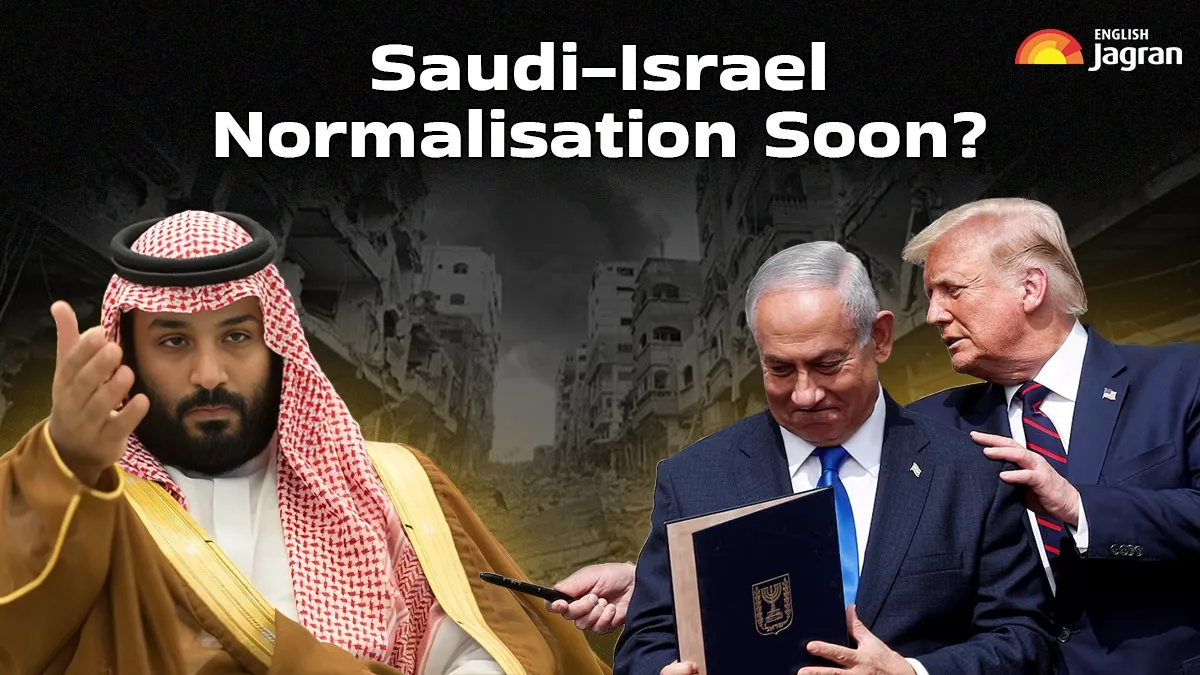- By Imran Zafar
- Wed, 05 Feb 2025 02:17 PM (IST)
- Source:JND
Israeli Prime Minister Benjamin Netanyahu expressed confidence that normalisation between Israel and Saudi Arabia will happen soon and take many by surprise. Speaking at a joint press conference with former US President Donald Trump at the White House on Tuesday, Netanyahu, currently on a US visit following a ceasefire between Hamas and Israel, asserted that a deal with Riyadh was imminent.
A potential Saudi-Israeli normalization agreement was a key focus of Netanyahu’s meeting with Trump, with the former US president pushing to expedite the process. Trump has already sent his special envoy, Steve Witkoff, to Riyadh multiple times to lay the groundwork.
Building on the Abraham Accords, which saw Israel establish diplomatic ties with the UAE, Bahrain, Morocco and Sudan during his first term, Trump now aims to broker a landmark agreement between Israel and Saudi Arabia, one that could redefine the Israel-Palestine conflict and reshape regional politics.
-1738753348263.jpg)
However, Saudi Arabia remains firm on its position that normalisation with Israel will not occur unless Palestinian statehood is realised. Riyadh reiterated its demand for an independent Palestinian state with East Jerusalem as its capital. The Saudi Foreign Ministry reaffirmed its "firm and unwavering" stance, echoing past statements by Crown Prince Mohammed bin Salman (MBS).
ALSO READ: Trump Wants US Takeover Of War-Torn Gaza, Proposes Permanent Displacement Of Palestinians
Hurdles Saudi-Israeli Normalisation Face
October 7 Hamas Attack And Its Impact On Saudi-Israel Normalisation Talks
The October 7 Hamas attack on Israel complicated efforts for normalisation. Ex-US President Joe Biden suggested that Hamas launched its attack in part to disrupt the Saudi-Israel deal. With over 61,000 Palestinians killed in the Israeli offensive on Gaza, the road to normalisation appears increasingly difficult. The destruction of shelters, healthcare facilities, educational institutions and religious sites has further fueled tensions. Any potential agreement will likely require a sustained ceasefire and substantial humanitarian efforts.
Internal Israeli Politics And Coalition Challenges
Israeli Prime Minister Benjamin Netanyahu, who has long opposed Palestinian statehood, has openly declared his commitment to preventing its establishment. The stark contrast in positions makes a near-term agreement highly improbable.
Additionally, Netanyahu's fragile political coalition adds another layer of complexity. His far-right partners, such as National Security Minister Itamar Ben Gvir and Finance Minister Bezalel Smotrich, strongly oppose Palestinian statehood. If Netanyahu proceeds with the deal, he risks losing coalition support, which could collapse his government. Despite 73 per cent of Israelis supporting the normalisation agreement, internal divisions make implementation uncertain.
ALSO READ: 'Will Deport Pro-Jihadists': Trump Orders Universities To 'Track' And 'Report' Pro-Hamas Students
Security And Regional Stability Concerns
Saudi Arabia’s leadership views regional stability as crucial for its ambitious Vision 2030 economic transformation. Any forced Palestinian displacement from Gaza, as previously suggested by Trump, would threaten regional stability and strain relations with key Arab partners like Egypt and Jordan. Additionally, Saudi Arabia has consistently stressed that any agreement must include security guarantees for Israel and a clear path to Palestinian statehood.
Need For Comprehensive Peace Framework
For normalisation to proceed, a broader Middle East peace framework must be established. The potential involvement of the Palestinian Authority in Gaza’s governance and measures to sideline Hamas would be critical components. Trump’s 2020 peace plan, while insufficient, might serve as a starting point. However, bringing a US-Saudi security treaty to the US Senate for ratification will require bipartisan support, which could be challenging given Trump’s divisive domestic policies.
